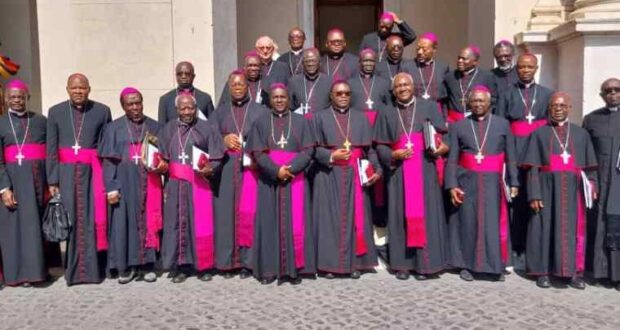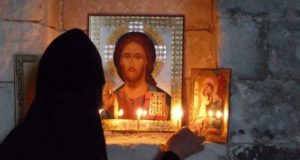📌 “المثلية الجنسية تزيّف وتفسد الأنثروبولوجيا البشرية
📌 المثلية الجنسية ليست حق من حقوق الإنسان. إنه اغتراب يلحق ضررا بالغا بالإنسانية.. إنه تجريد الحب من إنسانيته إنّه رجس..
📌 مواجهة اللواط حماية مشروعة للقيم الإنسانية الثابتة في مواجهة الرذيلة..
📌 هذه الممارسة مستحيلة بالنسبة للكنيسة الكاثوليكية..
Michael Haynes – تكرارًا لتعاليم الكنيسة المستمرة التي تحظر وتدين الأفعال الجنسية المثلية، أصدر الأساقفة حظرًا على أي بركات للأزواج المثليين، مشيرين إلى أنهم “يمنعون رسميًا أي مباركة للأزواج المثليين في كنيسة الكاميرون”.
(LifeSiteNews) – أصدر الأساقفة الكاثوليك في الكاميرون قرارًا برفض الوثيقة الفاتيكانية التي تدعو إلى مباركة المثليين، مشيرين إلى أنهم “يمنعون رسميًا” أي مباركة للأزواج المثليين في البلاد.
وجاء في بيان الأساقفة الكاميرونيين أن “المثلية الجنسية تزيّف وتفسد الأنثروبولوجيا البشرية وتستخف بالجنس والزواج والأسرة، وهي أسس المجتمع”. “في الواقع، المثلية الجنسية تضع بالإنسانية على نفسها وتدمرها”.
تم التوقيع بالنيابة عن أساقفة البلاد الـ 33 من قبل رئيس الأساقفة أندرو فوانيا نكيا (رئيس المؤتمر الأسقفي الوطني في الكاميرون) وتم إصدار وثيقتهم “من أجل الكرامة الإنسانية وخلاص البشرية جمعاء في يسوع المسيح”.
تم نشره في 21 كانون الأول (ديسمبر) – ردًا على نص البابا فرانسيس والكاردينال فيكتور فرنانديز في 18 كانون الأول (ديسمبر) Fiducia Supplicans الذي يوافق على مباركة الأزواج المثليين – أشار البيان إلى “موجة من السخط والتساؤل والقلق” التي انتشرت في ضوء Fiducia Supplicans .
ربما يمثل بيان أساقفة الكاميرون أقوى تدخل حتى الآن في التداعيات السريعة غير المسبوقة على وثيقة الفاتيكان. لقد أدانوا ليس فقط ممارسة البركات المثلية، بل حتى ممارسة التسامح مع المثلية الجنسية. وبالاعتماد على التعاليم الكاثوليكية والكتاب المقدس، ذكر النص كيف أن ممارسة المثلية الجنسية هي “انتهاك صارخ للتراث الذي ورثه لنا أسلافنا”، وكانت “علامة واضحة على انحطاط الحضارات”.
وعلى النقيض من الحجج السائدة في العديد من مجالات المجتمع، اقتبس الأساقفة الكاميرونيون من رومية (١: ٢٦) مشيرين إلى أن “الأفعال الجنسية المثلية ليست ’جنسية‘، بل ’أفعال ضد الطبيعة‘”.
وتابعوا وكتبوا:
المثلية الجنسية ليست حق من حقوق الإنسان. إنه اغتراب يلحق ضررا بالغا بالإنسانية لأنه لا يقوم على أي قيمة خاصة بالإنسان: إنه تجريد الحب من إنسانيته، “رجسا”. (لاويين 18:22)
علاوة على ذلك، “إن رفضها [المثلية الجنسية] لا يشكل تمييزًا بأي حال من الأحوال؛ وأضافوا: “إنها حماية مشروعة للقيم الإنسانية الثابتة في مواجهة الرذيلة التي أصبحت موضوع المطالبة بالاعتراف القانوني، واليوم موضوع نعمة”.
وبينما دافع نص البابا عن مباركة الأزواج في العلاقات المثلية، دون المطالبة بالتوبة عن رفض أسلوب الحياة المثلي، حذر أساقفة الكاميرون من أن هذه الممارسة مستحيلة بالنسبة للكنيسة الكاثوليكية. وكتبوا أن تقديم البركة لزوجين مثليين “سيكون بمثابة تشجيع على اختيار وممارسة الحياة التي لا يمكن الاعتراف بها على أنها موجهة بشكل موضوعي إلى مخططات الله المعلنة”.
بالإضافة إلى ذلك، حذر الأساقفة من أن “التمييز بين السياقات الليتورجية وغير الليتورجية من أجل تطبيق البركة على الأزواج المثليين هو أمر نفاق”. وبالتالي، نصوا على أننا “لذلك نعلن عدم الامتثال لأي شكل من أشكال البركة، العامة أو الخاصة، التي تميل إلى الاعتراف بـ “الأزواج المثليين” كحالة في الحياة”.
وتأكيدًا على تعاليم الكنيسة المستمرة التي تحظر وتدين الأفعال الجنسية المثلية، اختتم الأساقفة كلامهم بإعلان واضح عن حظر أي بركات من هذا القبيل للأزواج المثليين: “نحن نمنع رسميًا كل مباركة “الأزواج المثليين” في كنيسة الكاميرون”.
بل على العكس من ذلك، حثوا على تقديم الصلوات من أجل تحول المثليين جنسياً، بدلاً من مباركة علاقاتهم. وسلط البيان الضوء على الرفض القاطع في الكاميرون للقبول الواسع النطاق للمثلية الجنسية الموجودة في العديد من البلدان في أوروبا والأمريكتين:
وبما أن الله لا يريد موت الخاطئ، بل اهتداءه إلى الحياة الأبدية، فإننا نوصي الميالين إلى المثلية الجنسية بصلاة الكنيسة ورأفتها، بهدف تحولهم الجذري.
كما ندعوهم إلى الابتعاد عن عقلية الضحية التي يستمتعون فيها باعتبار أنفسهم “ضحايا” و”ضعفاء” و”أقليات”. لكي ينتهزوا فرصة التوبة التي يمنحهم إياها الله في إرشادات كلمته الكثيرة.
ينضم الأساقفة الكاميرونيون إلى قائمة متزايدة باطراد من مؤتمرات الأساقفة والأساقفة الذين أصدروا رفضًا لـ Fiducia Supplicans وأي محاولات للموافقة على ممارسة مباركة الأزواج المثليين.
بدأت الشرارات المبكرة لهذه الحركة مع الأسقف جوزيف ستريكلاند والأسقف أثناسيوس شنايدر، حيث دعا ستريكلاند إلى “صوت موحد” رافضًا للنص، وأصدرت أبرشية شنايدر حظرًا على “قبول أو أداء أي شكل من أشكال البركة على الإطلاق للأزواج في أماكن غير منتظمة”. الوضع والأزواج من نفس الجنس.”
تحت قيادة الكاردينال جوزيف راتزينغر في عام 1986، أصدر مجمع عقيدة الإيمان (CDF) وثيقة ترشد الأساقفة حول الرعاية الرعوية للأشخاص المثليين. ونصحت CDF الأساقفة بالتأكد من أنهم، وأي “برنامج رعوي” في الأبرشية، “يشيرون بوضوح إلى أن النشاط الجنسي المثلي غير أخلاقي”.
في الآونة الأخيرة، في عام 2021، أصدر CDF نصًا ينص بوضوح على أن الكنيسة ليس لديها “القدرة على منح مباركة اتحادات الأشخاص من نفس الجنس”.
يستمر نص البابا فرانسيس والكاردينال فرنانديز في إحداث تشكيك وعثرة للمؤمنين في الكنيسة الكاثوليكية.
Cameroon bishops ‘formally forbid all blessings of homosexual couples’
Michael Haynes – Reiterating the Church’s constant teaching prohibiting and condemning homosexual acts, the bishops issued a ban on any blessings of same-sex couples, stating that they “formally forbid all blessing of ‘homosexual couples’ in the Church of Cameroon.”
(LifeSiteNews) — The Catholic bishops of Cameroon have issued one of the strongest rejections of Pope Francis’ document advocating for same-sex blessings, stating that they “formally forbid” any blessings of same-sex couples in the country.
“Homosexuality falsifies and corrupts human anthropology and trivializes sexuality, marriage and the family, the foundations of society,” read the Cameroon bishops’ statement. “In fact homosexuality sets humanity against itself and destroys it.”
Signed by on behalf of the 33 prelates of the country by Archbishop Andrew Fuanya Nkea (president of the National Episcopal Conference of Cameroon) their document was issued “for the sake of human dignity and the salvation of all humanity in Jesus Christ.”
Published December 21 – in response to Pope Francis’ and Cardinal Victor Fernández’s December 18 text Fiducia Supplicans approving blessing of same-sex couples – the statement made reference to a “wave of indignation, questioning and concern” which had spread in light of Fiducia Supplicans.
The Cameroon bishops’ statement marks perhaps the strongest intervention yet in the unprecedented, swift fallout over the Vatican’s document. They condemned not just the practice of same-sex blessings, but the practice of even tolerating homosexuality. Drawing on Catholic teaching and Sacred Scripture, the text stated how the practice of homosexuality is “a flagrant violation of the heritage bequeathed to us by our ancestors,” and was a “clear sign of the imploding decadence of civilizations.”
In contrast to the prevailing arguments in many areas of society, the Cameroon prelates quoted from Romans (1:26) noting that “homosexual acts are not ‘sexual,’ but ‘acts against nature.’”
Continuing, they wrote:
homosexuality is not a human right. It is an alienation that seriously harms humanity because it is not based on any value proper to the human being: it is a dehumanization of love, “an abomination.” (Lev 18:22)
Furthermore, “rejecting it [homosexuality] is in no way being discriminative; it is a legitimate protection of the constant values of humanity in the face of a vice that has become the subject of a claim to legal recognition and, today, the subject of a blessing,” they added.
While the Pope’s text argued in favor of blessings for couples in same-sex relationships, without demanding repentance of rejection of the homosexual lifestyle, the Cameroon bishops warned that this practice was impossible for the Catholic Church. To offer a blessing to a homosexual couple “would be tantamount to encouraging a choice and practice of life that cannot be recognized as being objectively ordered to the reveal designs of God,” they wrote.
Additionally, the bishops warned that “differentiating between liturgical and non-liturgical contexts in order to apply the blessing to same-sex ‘couples’ is hypocritical.” Consequently, they stipulated that “we therefore declare non-compliant any form of blessing, public or private, that tends to recognize ‘same-sex couples’ as a state in life.”
Reiterating the Church’s constant teaching prohibiting and condemning homosexual acts, the bishops closed by clearly pronouncing a ban on any such blessings for same-sex couples: “we formally forbid all blessing of ‘homosexual couples’ in the Church of Cameroon.”
On the contrary, they urged that prayers for homosexuals’ conversion be offered, rather than blessings of their relationships. The statement highlighted a firm rejection in Cameroon of the widespread acceptance of homosexuality which is found in many countries in Europe and the Americas:
Since God does not want the death of the sinner, but his/her conversion to eternal life, we recommend those who are inclined to homosexuality to the prayers and compassion of the Church, with a view to their radical conversion.
We also invite them to turn away from their mentality of victimization in which they take pleasure in considering themselves as “victims,” “weak,” “minorities,”; in order to seize the opportunity for conversion that God gives them in the many exhortations of His word.
The Cameroon bishops join what is a steadily growing list of prelates and bishops’ conferences who have issued rejections of Fiducia Supplicans and any attempts to approve the practice of blessing same-sex couples.
The early sparks of this movement began with Bishop Joseph Strickland and Bishop Athanasius Schneider, with Strickland calling for a “united voice” rejecting the text, and Schneider’s archdiocese issuing a prohibition of “accepting or performing any form of blessing whatsoever of couples in an irregular situation and same-sex couples.”
Under the leadership of Cardinal Joseph Ratzinger in 1986, the Congregation for the Doctrine of the Faith (CDF) issued a document instructing bishops on the pastoral care of homosexual persons. The CDF admonished bishops to ensure they, and any “pastoral programme” in the diocese, are “clearly stating that homosexual activity is immoral.”
As recently as in 2021, the CDF issued a text that stated clearly the Church does not have the “power to give the blessing to unions of persons of the same sex.”
Pope Francis’ and Cardinal Fernández’s text continues to cause global chaos in the Catholic Church.
 Agoraleaks Agoraleaks
Agoraleaks Agoraleaks







